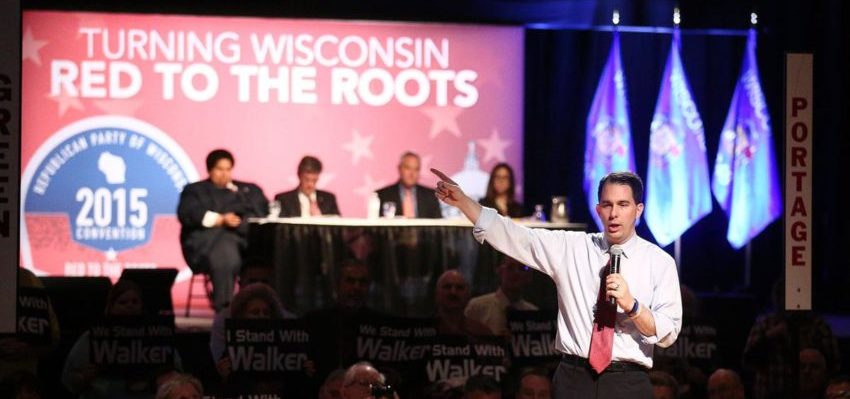 Portions of a post-mortem analysis of Gov @ScottWalker’s loss obtained by @DanODonnellShow paint a stark picture of a Republican Party that grew over-dependent on consultants and alienated its volunteer base. #wipolitics #wiright Click To Tweet
Portions of a post-mortem analysis of Gov @ScottWalker’s loss obtained by @DanODonnellShow paint a stark picture of a Republican Party that grew over-dependent on consultants and alienated its volunteer base. #wipolitics #wiright Click To Tweet
May 8, 2019
Special Guest Perspective by Dan O’Donnell
If Wisconsin Supreme Court Justice-Elect Brian Hagedorn’s upset win last month provided demonstrable proof that the state’s grassroots drive conservative success in this state, draft portions of the Republican Party of Wisconsin’s post-mortem of the 2018 midterm election should remove all doubt.
“Over time, the Republican Party of Wisconsin drifted from its roots as a grassroots organization and became a top-down bureaucracy, disconnected from local activists…” the post-mortem found.
The documents obtained by the MacIver Institute paint a picture of a Party that had lost touch with its most loyal of supporters and as such lost every statewide election on the ballot in November.
“Over time, the Republican Party of Wisconsin (RPW) drifted from its roots as a grassroots organization and became a top-down bureaucracy, disconnected from local activists, recklessly reliant on outside consultants and took for granted money that was raised to keep the Party functioning properly,” the post-mortem found.
Local Republican Party leaders repeatedly expressed this concern, but were rebuffed and, more troublingly, “there was an additional problem concealed from the grassroots leaders—cash flow concerns, debt, and financial morass.”
The latest quarterly financial reporting figures from the Federal Election Commission show the Republican Party with $220,680.46 in cash on hand as of March 31, but the Party also held outstanding debt of $142,437.12.
This reflects the top-down organizational structure that, party leaders are concerned, hampered Governor Walker’s re-election effort last year.
“In calendar year 2018, a small handful of consultants were paid well over a half of a million dollars,” the post-mortem continued. “Some of this group performed valuable and necessary functions appropriately contracted for externally.”
“However, some of the consultants were providing services that are appropriately and more economically performed in-house in other states. Still others had few, if any, discernible job responsibilities or expectations of deliveries.”
This didn’t just drain the Party’s resources; it also “prevented RPW from building [its] farm team of future staff and young party leaders.”
Whether the over-reliance on outside consultants led to the alienation of grassroots leaders and in-house RPW staff or the consultants were hired because the staff and grassroots were unable to perform their assigned duties is still open to debate.
“Whether a failure in training, or a simple preference for paying a consultant rather than hiring the right staff, the end result was overpaying for services,” the post-mortem concluded.
As the RPW grew more dependent upon consultants, it also isolated itself from the grassroots volunteers on whom it had relied far more heavily during the 2010, 2011 and 2012 recall, and 2014 election cycles.
Those volunteers told RPW staff compiling the post-mortem that the organization didn’t effectively communicate with them and that its staff was “sometimes unhelpful, unresponsive [and] even rude.”
As the RPW grew more dependent upon consultants, it also isolated itself from the grassroots volunteers on whom it had relied far more heavily during the 2010, 2011 and 2012 recall, and 2014 election cycles.
Additionally, they felt that the Party’s website was “cumbersome and not as useful as it should be.”
Fissures within the RPW were not secret in the wake of losses by Governor Scott Walker, Attorney General Brad Schimel, Senate candidate Leah Vukmir as well as Republican candidates for Secretary of State and State Treasurer. In late February, Mark Morgan resigned as the Party’s Executive Director. A week later, Party Chairman Brad Courtney stepped down as well.
When Mark Jefferson returned to serve as Executive Director—a position he held from 2007 to 2011—he immediately pledged to return the RPW to the bottom-up structure with which he felt more comfortable.
“Everybody has their lane and the best lane that the Republican Party has is the grassroots activation,” he told News/Talk 1130 WISN at the time. “We’re the one entity that can get people off the couch and knocking on doors and making phone calls.”
Andrew Hitt, elected Party Chairman in the wake of Courtney’s departure, concurred, and the new leadership team’s recommitment paid nearly immediate dividends with Hagedorn’s win less than a month later.
“There’s more bang for the buck in investing in grassroots and volunteer mobilization,” Jefferson told the MacIver Institute this week. “Is the money better spent getting a few more advertisements or in training people and engaging with people all over the state? We think that the money put into boots on the ground is better dollar-for-dollar than anything else you can spend money on.”
Jefferson admits that the Party’s debt is still an issue, but a manageable one since it continues to raise money ahead of the 2020 presidential election cycle. 18 months out, he is hopeful that the Party learned from the mistakes of 2018 and can build on the momentum of the Supreme Court race.
“There’s a renewed sense of enthusiasm on the ground because we have rededicated ourselves to building that enthusiasm and channeling it into action.”